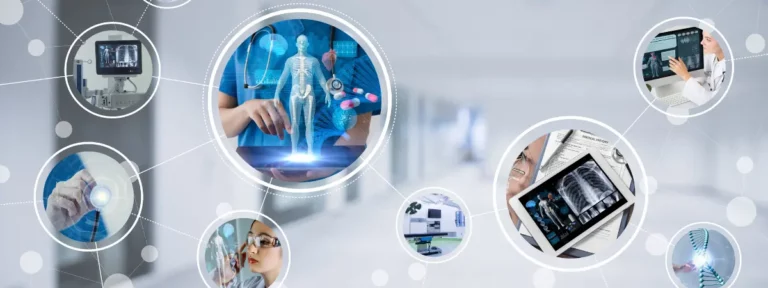In the fast-paced healthcare industry, optimizing medical practice workflows is crucial for delivering efficient and high-quality care. By streamlining processes, improving coordination, and leveraging technology, healthcare providers can enhance patient experiences, reduce errors, and improve operational efficiency. Workflow optimization involves standardizing protocols, integrating systems, automating tasks, and ensuring seamless communication. It not only benefits patients through improved access to care and smoother transitions but also supports healthcare providers in delivering timely and accurate diagnoses, treatments, and documentation. Embracing workflow optimization is essential for healthcare organizations seeking to thrive in today's demanding healthcare landscape.
Interoperability in healthcare IT is the key to breaking down data silos and revolutionizing patient care. By enabling seamless communication and collaboration among healthcare systems and applications, interoperability ensures the secure exchange of critical patient information. It eliminates the barriers posed by isolated data silos, allowing healthcare providers to access comprehensive and real-time data, make informed decisions, and improve patient outcomes. Embracing interoperability standards and technologies is essential for unlocking the full potential of health data and transforming healthcare delivery.
Physician engagement serves as a vital force in propelling innovation within the healthcare system. When physicians are engaged, they become advocates for change, driving improvements in patient care, operational efficiency, and outcomes. Their frontline experience equips them with unique perspectives, allowing them to identify challenges and design solutions that address the evolving needs of both patients and healthcare providers. Through physician engagement, healthcare organizations unlock the full potential of their workforce. By embracing a multidisciplinary approach and involving physicians in decision-making processes, ideas flourish and barriers to innovation are dismantled.
Merit-Based Incentive Payment System (MIPS) is a pivotal program in healthcare reimbursement. Designed to promote quality care and efficiency, MIPS evaluates providers based on performance metrics across various categories. By participating in MIPS, healthcare professionals can receive financial incentives or face penalties depending on their performance. This system encourages healthcare providers to continually improve patient outcomes, enhance care coordination, and embrace technological advancements. Stay informed about MIPS to navigate the evolving value-based reimbursement landscape and drive positive healthcare delivery changes.
Understanding the Impact of ICD-10 Coding on Medical Billing is crucial for healthcare professionals. With the transition to ICD-10, the coding system has become more extensive and specific, affecting billing processes significantly. Accurate coding is essential to ensure proper reimbursement, avoid claim denials, and enhance revenue generation. It requires a deep understanding of the coding guidelines, documentation requirements, and the relationship between diagnoses and procedures. Additionally, mastering ICD-10 coding facilitates efficient data analysis, improves patient care coordination, and supports healthcare decision-making.





